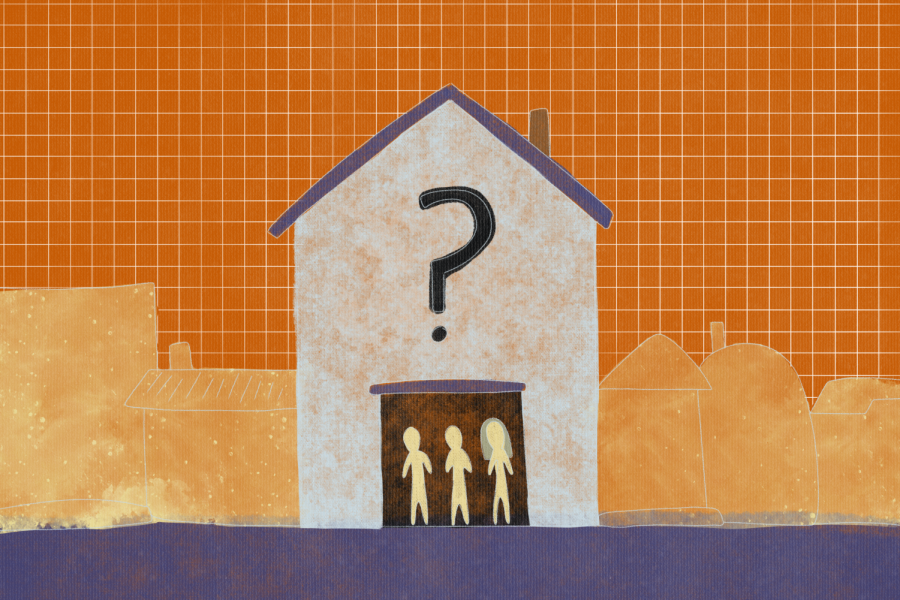The Daily Explains: What is Evanston’s “Brothel Law”?
Evanston’s infamous “Brothel Law” never actually targeted brothels. But today it complicates housing for residents hoping to live in large groups of non-family members.
October 18, 2021
How many roommates would you want to live with in your first apartment?
To upperclassmen living off-campus who juggle rent, compatibility and square footage, that’s a common social and financial question. But in Evanston, where students, landlords and tenants have to work around the city’s three-person occupancy limit, it’s a legal question, too.
Here’s a dive into the past, present and possible future of Evanston’s three-unrelated rule, also known as the “Brothel Law.”
What is the “Brothel Law”?
The “Brothel Law,” an Evanston zoning rule, bars more than three people who aren’t related to each other from living in the same housing unit without a special permit.
The specificity of “housing unit” is important. More than three unrelated people could live within the same house, as long as they don’t live in the same division of that house or on the same lease. In Evanston, multi-lease houses most frequently occur in the form of separated apartments, or accessory dwelling units.
What are ADUs?
Accessory dwelling units are small housing units placed on a property that already exists. They’re fully independent from the main house on the property, and must have their own kitchen, bathroom, outside entrance, and sleeping and living space. If you’re a student living in an off-campus house, your house may contain multiple ADUs.
ADUs can be built from scratch either as standalone structures or on new floors of the house. They can also be created by renovating a section of the property itself. They exist for various functions, like expanding an existing home, converting a garage into a livable space or creating a rental property within a home.
In Evanston, many ADUs are located near Northwestern’s campus and upperclassmen rent them as off-campus housing. Since Northwestern has a 2-year live-in requirement, all underclassmen live in dorms, and most move off-campus junior year, when dorms are no longer guaranteed. Multiple ADUs can exist in one student house. Elsewhere in Evanston, ADUs grant independent living space to elderly parents or relatives with disabilities.
Why does the law exist?
Despite its memorable moniker, the law has nothing to do with brothels, nor does it specifically target women and sex workers, as the nickname and urban legends would suggest. Instead, advocates of the “Brothel Law” say it prevents landlords from turning residential houses near campus into student housing, thus preventing noise complaints.
During an April 2018 City Council meeting, former Ald. Judy Fiske (1st) argued the law prevents student housing from taking over neighborhoods, disrupting and driving out permanent residents.
“No one is trying to keep students from having good, clean, safe affordable housing,” Fiske said. “It’s just, how do we do that and protect the residential neighborhoods and make permanent residents feel comfortable? It’s a balancing (act).”
How does the law affect students living off-campus?
Most rental properties in Evanston are compliant, so off-campus students often can’t live with more than two roommates in their apartments or houses. That limits the number of ways roommates can split rent, increasing the share each one must take on to pay for housing in Evanston’s already expensive market — or incentivizing students to keep their names off leases and rent or sublet under the table, opening themselves up to financial liability or eviction.
Some rental properties in Evanston have found ways around the law, but, for most of its existence, it has gone relatively unenforced. In 2011 and 2012, however, the city recommitted to enforce it en masse, placing numerous students in danger of eviction. After months of student outcry and tense relations between the city and the University, the issue died down, and no “Brothel Law”-related evictions occured. The city has not attempted widespread enforcement since.
How does the law affect Evanston residents?
Housing advocates argue the “Brothel Law” prevents the expansion of affordable housing in Evanston, and also fails to achieve its stated goal of managing and limiting the proliferation of student housing.
During discussions last spring, community organization Joining Forces for Affordable Housing demanded the council repeal the law, arguing it discriminates against residents who wish to live outside nuclear family structures.
“The insistence that we preserve our neighborhoods for ‘regular’ and ‘normal’ families is reminiscent of the racist propaganda that was used in the 1950s to promote single-family home ownership and the American Dream for the white middle class,” the statement reads.
Have city officials attempted to change the law?
They’ve certainly attempted.
The law is a recurring topic of conversation for City Council, which considered proposals to reform or repeal it in 2011, 2013, 2018 and most recently in spring 2021. Sue Loellbach, manager of Advocacy for Connections for the Homeless, wrote an op-ed for Evanston Now last April asking the council to repeal the law to allow for easier access to affordable housing.
“Sharing housing has always been a survival strategy for people who cannot afford housing on their own,” Loellbach wrote. “The three-unrelated rule prohibits this strategy, even criminalizes it.”
A proposal for repeal or reform has never reached a full City Council vote. Until that happens, Evanston’s “Brothel Law” will remain on the books, rarely enforced but easily felt throughout NU and Evanston communities.
Email: alexharrison2023@u.northwestern.edu
Twitter: @alexhairysun
Related Stories:
— Zoning committee discusses ‘brothel law’ in Wednesday meeting
— City to continue discussion of ‘brothel law’
— Amendments to ‘brothel law’ brought before city



